National Small Enterprise Amendment Bill
Parliamentary Portfolio Committee on Small Business Development covers the National Small Enterprise Amendment Bill. It includes insights on the Small Enterprise Development Finance Agency, dispute resolution mechanisms, and transitional arrangements. The discussion highlights the importance of small businesses in the South African economy and addresses challenges such as regulatory environments and competition. The Property Point initiative, focusing on sustainability and market access for small businesses, is also featured. Additionally, the presentation emphasizes the significance of relationships, risk management, and reputation building in supporting small enterprises.
Download Presentation

Please find below an Image/Link to download the presentation.
The content on the website is provided AS IS for your information and personal use only. It may not be sold, licensed, or shared on other websites without obtaining consent from the author.If you encounter any issues during the download, it is possible that the publisher has removed the file from their server.
You are allowed to download the files provided on this website for personal or commercial use, subject to the condition that they are used lawfully. All files are the property of their respective owners.
The content on the website is provided AS IS for your information and personal use only. It may not be sold, licensed, or shared on other websites without obtaining consent from the author.
E N D
Presentation Transcript
Presentation to PARLIAMENTARY PORTFOLIO COMMITTEE: SMALL BUSINESS DEVELOPMENT on the NATIONAL SMALL ENTERPRISE AMENDMENT BILL [B16-2023] 28 November 2023 By: Nokwanda Motsitsi
Agenda 1. Introduction and Context 2. Overview of Property Point 3. Inputs to the NSEA Bill, 2023 a. Small Enterprise Development Finance Agency (SEDFA) b. Dispute Resolution Mechanism c. National Review of Small Enterprises d. Transitional Arrangements 4. Concluding General Observations
1. Introduction and Context Small Business Landscape in South Africa Pivotal Economic Role: Significant contributors to job creation, economic growth and community development Agility and innovation Challenges Faced: Accessing financial and non-financial support Navigating regulatory environments High competition Importance of Support Acknowledging the vital role of small businesses in the economy The NSEA Bill aims to address challenges and create an enabling environment
2. Property Point Overview Establishment: Founded in 2008 Evolved into an industry initiative Partnership and Collaboration: Partners with some of the largest property organizations in the country Mission and Focus: Enables sustainability for small businesses Focus on access to markets, access to funding, and business development support Awards and Recognition: Named 2018 Accelerator of the Year 2020 Aspen Network of Development Entrepreneurs Small and Growing Business Builder of the Year Impact and Achievements: Facilitated market opportunities worth more than R2.3 billion 502 SMMEs participated in its two-year enterprise and supplier development program More than 6000 jobs created through the program SMMEs on the program report average revenue growth of 42.4% over the past 15 years
The Property Point How Relationships Risk Reputation Minimising the risk perception of small businesses in the property industry Assisting entrepreneurs to establish a good reputation Building solid relationships (capability, capacity, competence)
Presence Independent NPC: Property Point LIMPOPO Venture Catalyst (PBO) Headquarters are at 5th Floor, MPUMALANGA GAUTENG 138 West Street, Sandton. NORTH WEST Currently running programmes in FREE STATE Gauteng, KwaZulu Natal, KWAZULU NATAL Northwest and Western Cape NORTHERN CAPE Total staff complement: 27 EASTERN CAPE ISO 9001 certified WESTERN CAPE
56% Women-owned Businesses R >2.3bn Total value of contracts awarded >502 Businesses incubated Greater than a Decade of Impact 15 Years 6 928 Jobs created (Full and part time) 72.5% Success rate of businesses on programme 11 419 Number of entrepreneurs who attended training/ workshops 42.4% The median annual revenue growth rate of companies from baseline assessment to graduation As of September 2023
3. Inputs to the NSEA Bill a. SEDFA Objectives: Merge The Co-operative Banks Development Agency (CBDA), Small Enterprise Financing Agency (SEFA) and Small Enterprise Development Agency (SEDA) Streamlining and centralising support for small enterprises Facilitating access to finance through various means Concerns: The definition and components of a service delivery network Recommendations Clarify the definition and components of a service delivery network to ensure clarity, consistency, accountability, and standardised interpretation and implementation across provinces and government departments
b. Ombud Objectives: Establishment of the Small Enterprise Ombud Service Provide an inexpensive and flexible procedure for dispute resolution Concerns: Initial estimated cost of R 3 500 000 in the 2024/25 financial year Possible overlapping of services with existing ombuds and channels Ambiguity in defining late payments Concentrated decision-making power. There is a need for decentralisation Recommendations: Explore diverse, innovative, and sustainable funding strategies Expand existing structures with a dedicated desk for small businesses Define late payments and propose interest on overdue invoices
c. National Review of Small Enterprises Objectives: We welcome the provision Comprehensive evaluation tool for assessing the status, challenges and opportunities Concerns: Lack of a specific timeline for completing the review Recommendations: Include a specific timeline for completing the review Propose the review to be conducted annually for a more comprehensive assessment
d. Transitional Arrangements Objectives: Ensure a smooth transition with minimal disruption in services and support Concerns: MTBPS = Budget cuts and worsening conditions for small enterprises Risk of job displacement or role redundancies during restructuring Potential delays and challenges in adapting to the expanded role of SEDFA Recommendations: Leverage diverse, innovative and multi-stakeholder funding strategies Measures to minimize job displacement The need for careful planning to avoid disruptions in services and support
4. Concluding General Observations Appreciation for the progressive nature of the Bill Emphasis on the need for a comprehensive Socio-Economic Impact Assessment Recommendations for careful budgeting Continued consultations with small enterprises
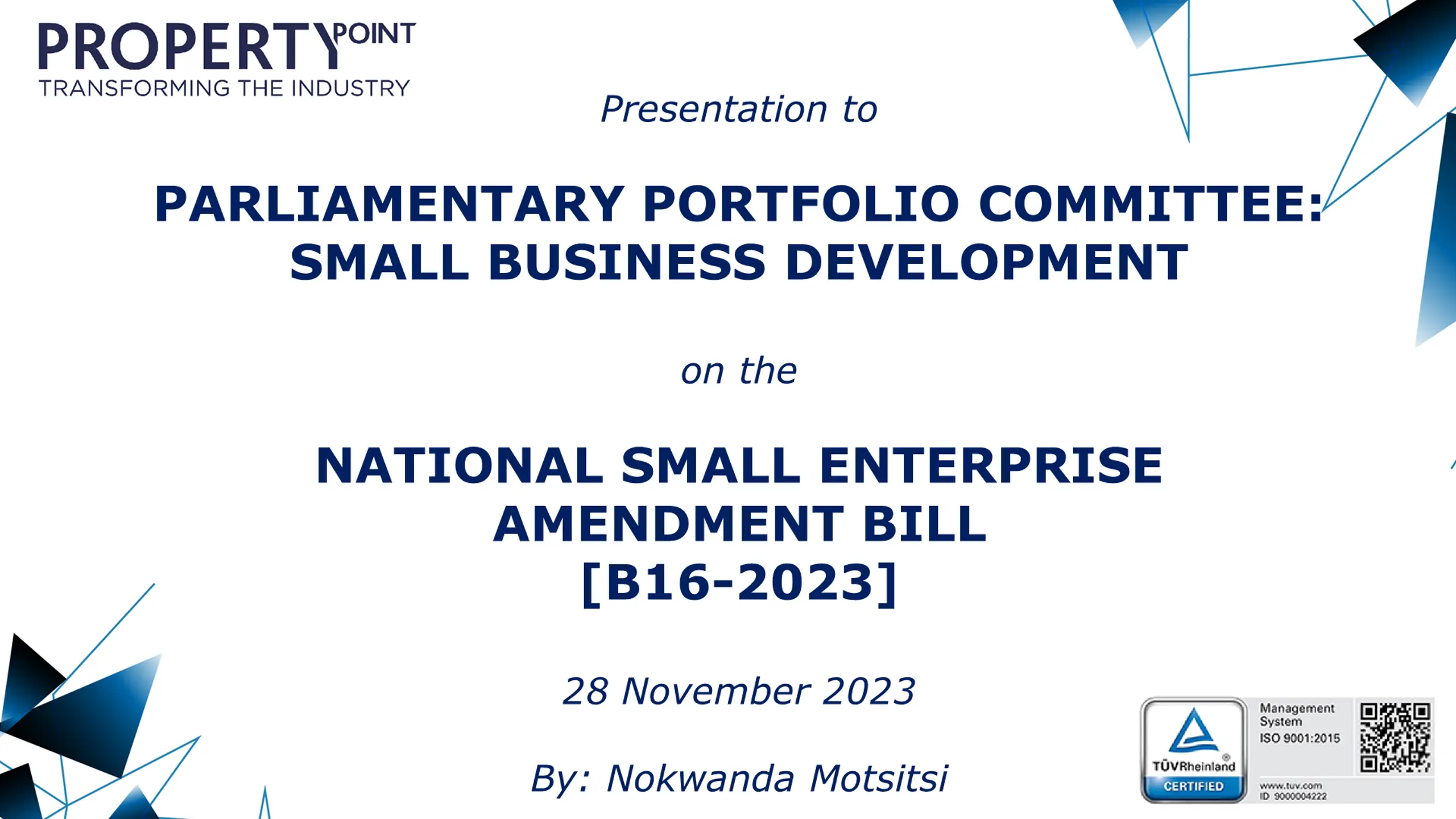

![RE: ELECTORAL MATTERS AMENDMENT BILL [ B42-2023]](/thumb/18837/re-electoral-matters-amendment-bill-b42-2023.jpg)


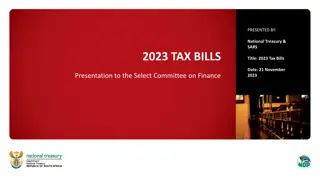


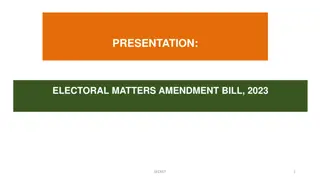


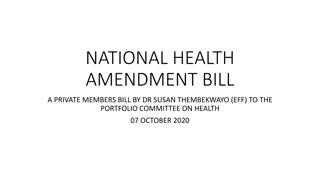

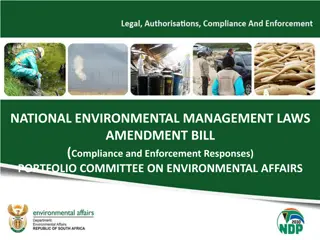


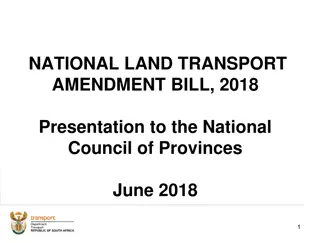
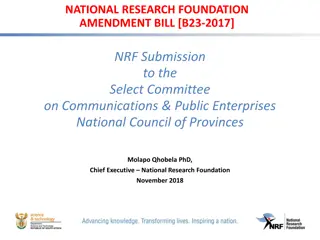


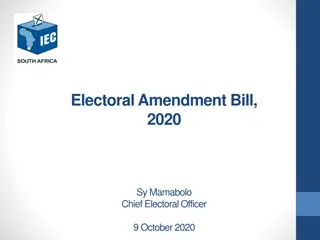

![Briefing on the Criminal Procedure Amendment Bill [B12-2021] to the Portfolio Committee on Justice and Correctional Services](/thumb/157093/briefing-on-the-criminal-procedure-amendment-bill-b12-2021-to-the-portfolio-committee-on-justice-and-correctional-services.jpg)
